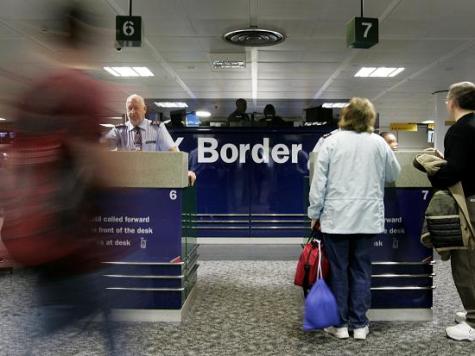Prime Minister David Cameron and Home Secretary Teresa May face embarrassment today as independent figures revealed that Britain’s net migration has jumped from 175,000 to 243,000 over the past year.
The jump, despite a pledge by the Conservative Party to reduce the number to ‘below 100,000’ comes just before the party conference season, where Cameron will no doubt face backlash from party activists who are of a more conservative disposition than him and his government.
The figures from March 2013 to March 2014 reveal an increase in the number of people coming to Britain, net migration being the measure of how many people arrive in Britain minus how many leave.
The BBC’s Home Affairs correspondent said the figures spelled ‘bad news’ for Cameron and May, and will add further grist to UKIP’s mill.
Nigel Farage’s party have for some years claimed that net migration is impossible to control due to Britain’s obligations under the Lisbon Treaty. European Union members are free to travel to, and settle in Britain, with Romania and Bulgaria becoming the latest countries to get freedom of movement for its citizens.
The figures reflect a “statistically significant” rise of immigration, up to 560,000 from 492,000 the year before. The number of Bulgarians and Romanians coming into the UK more than doubled.
The Office for National Statistics lists the following key figures:
- Net long-term migration to the UK was estimated to be 243,000 in the year ending March 2014, a statistically significant increase from 175,000 in the previous 12 months.
- While net migration has increased since the most recent low of 154,000 in the year ending September 2012, it remains below the peak of 320,000 in the year ending June 2005.
- 560,000 people immigrated to the UK in the year ending March 2014, a statistically significant increase from 492,000 in the previous 12 months. Two-thirds of the increase is accounted for by immigration of EU citizens (up 44,000 to 214,000).
- An estimated 316,000 people emigrated from the UK in the year ending March 2014. Long-term emigration has been relatively stable since 2010.
- 28,000 EU2 (Romanian and Bulgarian) citizens immigrated to the UK in the year ending March 2014, a statistically significant increase from 12,000 in the previous 12 months.
- There was a statistically significant increase in immigration for work (up 38,000 to 228,000), driven by increases for EU15 and EU2 citizens. Estimated employment of EU citizens was 17% higher in April to June 2014, compared to the same quarter in 2013.
- Immigration for study remained stable (177,000) in the year ending March 2014. Study visas granted in year ending June 2014 rose 7%, reflecting higher levels of university-sponsored applications (applications for other education sectors fell).
- 265,000 non-EU citizens immigrated to the UK in the year ending March 2014. This ends a steady decline since the recent peak of 334,000 in 2011.
- Work and study visas granted rose 10% (+14,799) and 7% (+13,885) respectively in the year ending June 2014, compared to the previous year, following a decline since 2011. The increase in work visas was largely accounted for by skilled work (+11,744).
- There were 23,479 asylum applications (main applicants) in the year ending June 2014, similar to the previous 12 months (23,523), but low relative to the 2002 peak (84,132).

COMMENTS
Please let us know if you're having issues with commenting.